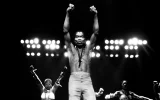Last Thursday, Malcolm Omirhobo appeared before the supreme court dressed as a ”juju priest”. The lawyer said he was exercising his fundamental rights following the June 17 verdict of the apex court which affirmed the wearing of hijab in schools.
On Monday, the human rights lawyer appeared before Justice Tijani Ringim dressed the same way, but the judge refused to hear the cases filed by him.
Omirhobo argued that the constitution says otherwise and he could choose to appear that way.
“My Lord, the rules cannot supersede the Constitution of the Federal Republic of Nigeria,” he said.
After listening to his argument, Ringim directed Omirhobo to address the court on why he should be heard the way he was dressed on the next adjourned date.
The court ordered that the address must not be more than five pages with authorities cited, adding that it must be filed before the adjourned date.
“You cannot address the court like this as a professional. I will adjourn your matter and you come and address the court if the rules allow you to appear in court like this,” the judge said.
Omirhobo’s first suit, FHC/L/CS/929/2022, was against the federal government of Nigeria and others.
His second suit; FHC/L/CS/1392/2021, was against the Nigeria Army and two others.
In an interview with Punch, Omirhobo described the garb as one usually worn by Olokun worshippers.
He said, “It is in response to the Supreme Court judgment of Friday (two weeks ago) against the Lagos Government that female Muslim pupils can now wear hijabs to school. I am being satirical; I am trying to comply with that judgment.
“By that judgment, they are saying that wearing a hijab is a mode of worship by female Muslim pupils and any attempt to deprive them of that will amount to the violation of their fundamental human right, freedom of thought, conscience and religion, and stopping or harassing them will amount to a violation of their right to dignity of their persons.
“It is not just an Islamic or private school; it is a public school. Nigeria is a multi-religious society. We have the traditional worshippers, Christians, Muslims, Rastafarians, and Buddhists. The judgement implies that as long as we all have rights, we all can be allowed to go to our places of work or school in our religious attire.”
He said that he was not being disrespectful to the court, he explained that he is an African man.
He added, “I am waiting to be told that I am not properly dressed. They should tell me what is proper dressing, according to the Constitution of Nigeria. Is there anything in the Legal Practitioners Act that defines the kind of dress I must wear?
“Whatever we wear is based on the convention that we should wear black and white. Can convention supersede the constitution? The law says one (law graduate) will be called to the Bar, and wear a wig and gown. Did the law say I should not wear a feather on my head?
“Did it say I must wear black and white? The law didn’t say so. So, what we are wearing is just about culture, and culture does not supersede the constitution. So, that just shows there is a lacuna in our laws. They need to look at them critically. Nobody should tell me what is decent about dressing.”













